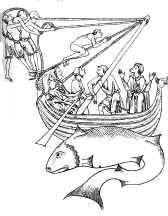 There is an ocean monster which is called an ASPIDO
DELONE in Greek. On the other hand, it is called an
'Aspido-Tortoise' in Latin. It is also called a WHALE
(cetus) because of the frightfulness of its body and because
it was this animal which swallowed [excepit) Jonah, and
its belly was so great that people took it to be Hell.
Jonah himself remarked: 'He heard me out of the belly
of Hell'.
There is an ocean monster which is called an ASPIDO
DELONE in Greek. On the other hand, it is called an
'Aspido-Tortoise' in Latin. It is also called a WHALE
(cetus) because of the frightfulness of its body and because
it was this animal which swallowed [excepit) Jonah, and
its belly was so great that people took it to be Hell.
Jonah himself remarked: 'He heard me out of the belly
of Hell'.
This animal lifts its back out of the open sea above the watery waves, and then it anchors itself in the one place; and on its back, what with the shingle of the ocean drawn there by the gales, a level lawn gets made and bushes begin to grow there. Sailing ships that happen to be going that way take it to be an island, and land on it. Then they make themselves a fireplace. But the Whale, feeling the hotness of the fire, suddenly plunges down into the depths of the deep, and pulls down the anchored ship with it into the profound. . . .
A image of Leviathan from a twelfth-century manuscript. [Click on thumbnail for a larger image.]
Now this is just the way in which unbelievers get paid out, I mean the people who are ignorant of the wiles of the Devil and place their hopes in him and in his works. They anchor themselves to him, and down they go into the fires of Hell.
Bibliography
White, T. H. The Bestiary: A Book of Beasts being a Translation from a Latin Bestiary of the Twelfth Century. New York: Capricorn Books/ G. P. Putnam's Sons, 1960.
Last modified 30 March 2009